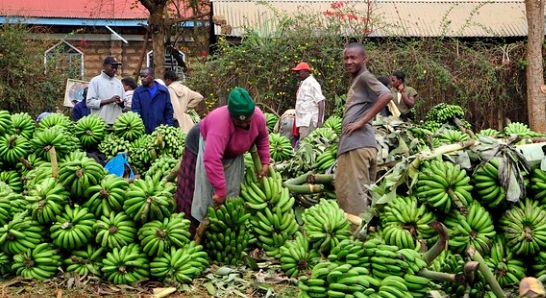Agriculture is a cornerstone of African economies, employing over 60% of the workforce and contributing substantially to the GDP of most nations. Despite this, many farmers struggle with poverty due to outdated practices, limited market access, and reliance on low-value crops. By embracing a new mindset, acquiring relevant skills, and implementing effective strategies, agriculture can evolve from subsistence farming into a profitable, wealth-creating venture.
Africa boasts vast areas of arable land, favorable climates, and a rapidly growing population that ensures increasing demand for food. These factors create a golden opportunity for Africans to view farming not as a last resort, but as a lucrative business.
Small-Scale Farming: A Path to Wealth Creation.
Small-scale farming is often underestimated, but when approached strategically, it can be a vital stepping stone to financial growth.
- Diversify with High-Value Crops: Instead of focusing solely on low-value staples like maize, farmers can cultivate higher-value crops such as chili, ginger, garlic, herbs, and organic vegetables. These command better prices in both local and international markets.
- Join Cooperatives and Outgrower Schemes: Small farmers can benefit significantly by joining cooperatives, which allow them to pool resources, access better markets, and negotiate superior prices. Outgrower schemes, often run by agro-processors, can also guarantee a market for produce and provide essential support like inputs and training.
Agri-Processing: Enhancing Value and Profitability.
Adding value to raw agricultural goods is a major way to build wealth. Processed products consistently command much higher prices than their unprocessed counterparts.

- Examples of Profitable Agri-Processing Ventures:
- Transforming cassava into flour, starch, or ethanol.
- Drying and packaging fruits like mangoes, pineapples, or bananas.
- Milling maize into flour.
- Extracting oil from sunflower or groundnuts. These ventures are particularly viable in farming communities where raw materials are abundant. Both local and export markets for processed foods are expanding, driven by increasing urbanization and a growing demand for convenience. Even simple equipment, such as a manual groundnut oil press or fruit dryer, can be a great starting point for agri-processing.
Livestock and Poultry Farming: High Returns with Smart Management
Livestock, poultry, and fish farming offer rapid growth and attractive profit margins. Unlike crop farming, these sectors can generate weekly or monthly cash flow and are less susceptible to weather fluctuations.
- Profitable Livestock Ventures Include:
- Poultry: Raising layers for eggs or broilers for meat.
- Goat and Sheep Rearing: High demand for meat in Middle Eastern and African markets.
- Pig Farming: Offers high returns, particularly in Southern and Central Africa.
- Fish Farming: Catfish or tilapia farming offers quick turnarounds and high market demand.
- Real Example: A poultry farmer in Nigeria who raises 1,000 broilers every six weeks can achieve a monthly net income exceeding $1,000 after accounting for feed and operational costs.
Export-Oriented Agribusiness: Tapping into Global Demand.
Significant wealth is being generated through export crops. Africa produces unique commodities that are in high global demand.

- Top Exportable Crops:
- Cocoa: Ghana, Ivory Coast, Nigeria
- Coffee: Ethiopia, Uganda, Rwanda
- Tea: Kenya, Malawi
- Macadamia Nuts: Kenya, South Africa, Malawi
- Avocados: Kenya, Tanzania, South Africa
- Cashews: Mozambique, Benin, Guinea-Bissau With proper quality control, packaging, and certification, these crops can fetch high prices in international markets. Governments and private sector entities are increasingly providing support for farmers to access global opportunities.
- Example: In Kenya, some avocado farmers earn over $10,000 annually per hectare from exports to Europe and China.
Farming as an Investment: Profiting Without Tilling the Soil
You don’t need to be directly involved in farming to profit from agriculture. Agriculture can be treated as an investment, similar to real estate or stocks, where capital is invested and operations are managed by professionals.
- Ways to Invest in Agriculture Without Farming:
- Agriculture Investment Platforms: Platforms like FarmCrowdy (Nigeria) or ThriveAgric allow you to sponsor farms and earn returns.
- Leasing Land to Farmers: Purchase land and lease it to experienced farmers or agri-cooperatives for rental income.
- Agri Real Estate: Develop and lease agricultural facilities such as cold rooms, warehouses, or storage silos.
- Buy Shares in Agribusinesses: Many agricultural companies listed on African stock exchanges offer strong returns.
Keys to Success in Agricultural Wealth Building.
- Education and Training: A strong understanding of agribusiness is crucial. Seek out courses, attend local training programs, and find mentors.
- Technology Adoption: Leverage mobile apps for weather updates, market prices, and extension services. AgTech is rapidly transforming African farming.
- Access to Finance: Explore agricultural loans, grants, and development funds available through banks and non-governmental organizations.
- Market Access: Prioritize growing what sells, not just what’s easy. Research market trends, engage with buyers, and consider contract farming.
- Scale Strategically: Start small, reinvest profits, and expand your operations in a methodical manner.

Farming: Africa’s Green Gold.
In the 21st century, agriculture in Africa should no longer be associated with poverty or backwardness. With modern tools, market access, and strategic investment approaches, farming can—and should—become a powerful driver of real, generational wealth.
Whether you’re actively farming, raising livestock, processing goods, or investing from the sidelines, the key is to approach agriculture as a business. Africa’s “green gold” is waiting to be harvested, and now is an opportune time to begin.
